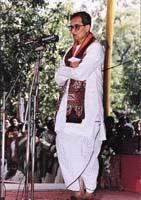This observation came back to me when I recently read about Amartya Sen's latest book, The Argumentative Indian:

...As a high-school student he had asked his Sanskrit teacher whether it was permissible to say that Krishna [in the Bhagavad Gita] got away with an incomplete and unconvincing argument.
“My Sanskrit teacher told me that maybe you could say that, but you must say it with adequate respect,” Sen recalled.
* * *
On the flight home, I was reading Conceptual Blockbusting by James L. Adams. While discussing the factors crucial for generating good ideas, Adams says,
[The United States'] is a self-conscious culture. New religions, forms, social movements and styles in dress, talk, entertainment and living crop upUnlike the Americans, we Indians carry a rather huge baggage in the form of a long history and hoary tradition. We have, what Adams calls, an "unselfconscious culture," where "traditional forms and ceremonies are perpetuated, and often taboos and legends work against change."
continually. Age and experience are venerated only if "relevant"... A very high value seems to be placed on innovation. Yet strangely enough, many individuals value tradition more than they do change. This is probably good... However, as far as good conceptualization is concerned, such an attitude has negative effects.
Our politicians are mostly fighting (alleged) historical wrongs. A large percent of our population is still hemmed in by archaic social laws. How much has such a culture actually cost us?
Things are changing now, thanks to various phenomena like the Internet and our students encountering new cultures while studying overseas. People are re-examining their baggage, trying to identify the rotten apples. A Good Thing.
This, however, we should hope to do (as was suggested to Amartya Sen) "with adequate respect."
6 comments :
With adequate respect. Yes, Srikanth.
Yes, indeed, Anand! Welcome to my blog!
This, however, we should hope to do (as was suggested to Amartya Sen) "with adequate respect."
How wonderful! I hope we do too.
Hi Sunil,
Thanks! As I wrote, the baggage we have inherited is a mixed one. I pray for wisdom to distinguish between the stuff I should carry and those I should not.
Hey, that was a nice post.
I do see the change alright and I truly hope that the change is not just a fad but a truly scientific one. At the same time here in US too I often come across people who still want to slam their beliefs to the next generation. There is some kind of 'this-is-how-we-indians-are-to-behave' thought making its rounds. I always thought travel makes a person more liberal, simple and tolerant...
Hi Rashmy,
Thanks! What you say about travel makes a lot of sense. And, as you say, thrusting something down anyone's throat never works.
Sorry about the late response - was out of town.
Post a Comment